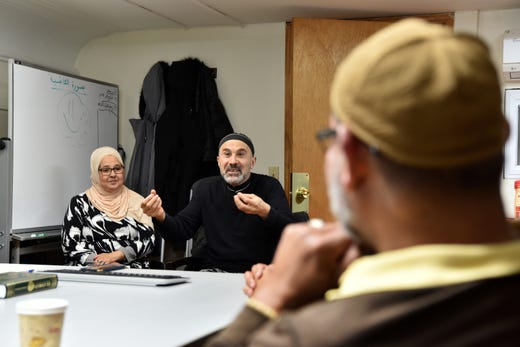- Latino converts said they are drawn to Islam because of the intense devotion to God, a simplicity in faith and focus on community…
Taking the decision after years of thinking, Luis Lopez still recalls the nervous moments as he walked to the crowded prayer hall in Union City with his son before taking shahada, USA Today reported.
“There is no God but Allah, and Muhammad is the messenger of Allah,” they declared at the mosque, located in a columned brick building that once housed a Cuban community center.
The 41-year-old father said the conversion and embrace by the congregation four months ago have brought a feeling of peace and a recognition of how far he’d come from a life that nearly ended 22 years ago in gang violence.
Lopez, who moved to the US from Puerto Rico as a child, said two events prompted him to change his life: a gang-related stabbing in 1997 and the birth of his son a year later.
At his friends’ urging, he visited a mosque and started reading about the faith.
“They told me, ‘Come to the mosque, you’re going to feel welcomed,’” said Lopez, 41, a truck driver and former professional boxer from North Bergen.
Growing Community
By converting, Lopez and his 21-year-old son joined a growing segment of the Latino population who are leaving Christianity for Islam.
According to the institute’s annual report ‘American Muslim Poll: Predicting and Preventing Islamophobia’, only 1% of Muslims identified as Hispanic in 2009. By 2018, it expanded to 7%.
According to a study of the Journal of Race, Ethnicity, and Religion on Muslim Latinos in the US, many American Latinos convert to Islam for a similar reason: the desire to have more direct and personal experience with God.
In fact, most American Latinos who converted to Islam are women of Mexican or Puerto Rican origin who justify their conversion as a return to a pre-Hispanic and pre-Catholic Muslim identity.

Outreach to Latinos
Latino Muslim communities have found a home in urban areas like New York City, Miami, Chicago, Los Angeles, and Houston.
Many Latino Muslim groups see Islam as a part of their heritage. They say they are returning to their roots because of the nearly 800-year Moorish rule of Spain that left an Islamic influence on Hispanic language and culture.
The message is that “we’re not choosing to abandon Latinx culture or embrace marginalization. We’re choosing to embrace something that’s already there,” said Harold Morales, associate professor of philosophy and religious studies at Morgan State University in Baltimore, Maryland.
Morales wrote the 2018 book, “Latino and Muslim in America: Race, Religion, and the Making of a New Minority.”
At the North Hudson Islamic Educational Center, where Lopez prays, the number of Latino converts has increased significantly.
“Our vision is to share the true teachings of Islam, the guidance of Islam, with as many people [as we can] in the North Jersey Hudson area,” said Mohammad Alhayek, the imam of the mosque.
“That is our first priority and then beyond [to reach] as many people as we can.”